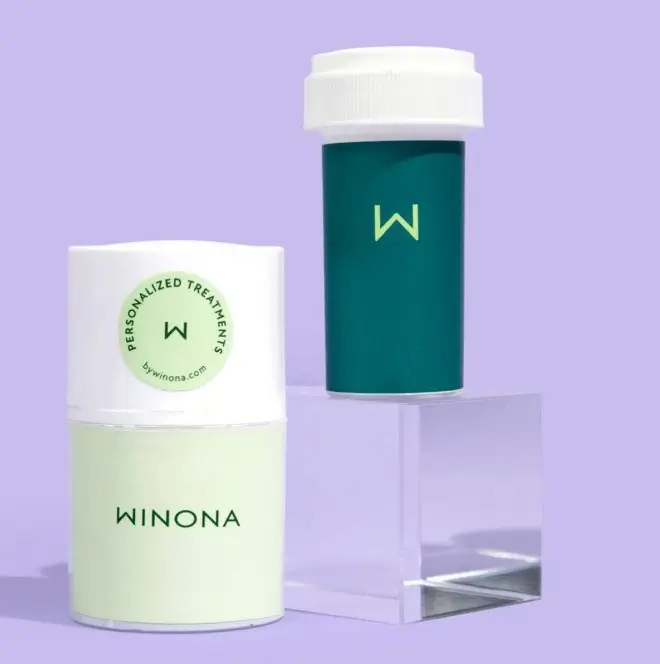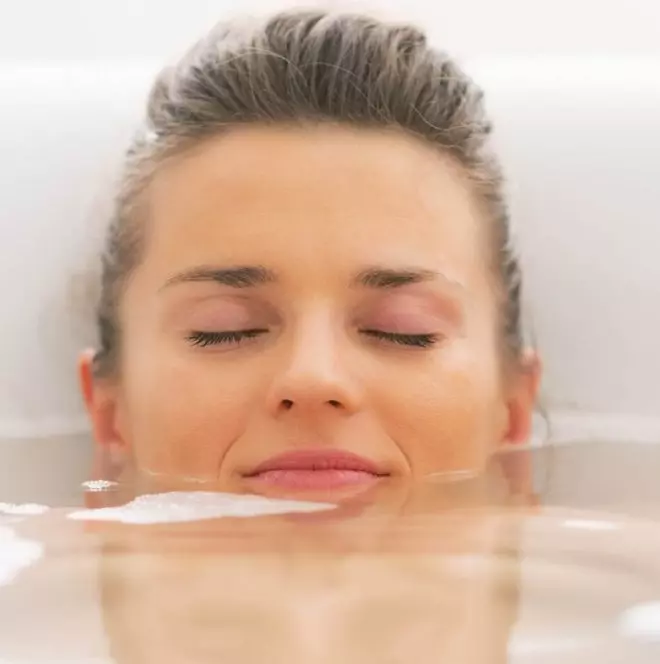
As we learn more about reproductive aging, we can provide effective treatment options and remedies for hot flashes and other menopause symptoms. Hot flashes are caused by a decreased production of the hormone estrogen and occur naturally as women approach menopause. While they are ‘natural,’ they can also be treated with natural hot flash remedies. While some companies sell herbs for hot flashes, Winona does not. We have chosen to provide hot flash medications that have proven to be the safest and most effective natural remedies for hot flashes.
Hot flashes (or vasomotor symptoms) are the most commonly reported symptom of perimenopause. A hot flash typically happens rapidly and lasts from one to ten minutes. Women can experience hot flashes a few times a week, or even ten times a day.
Hot flashes are one of the most discussed, and often chronic, symptoms of menopause. There is a long list of potential natural remedies and hot flash treatments, but hot flash medicine and remedies fall into two categories:
Diet
Lifestyle
Diet
Coffee: There are two reasons why coffee can trigger hot flashes: caffeine and heat. If it’s too hard to give up coffee, you can try it iced and maybe stop drinking it by noon.
Caffeinated Soda: Try the decaffeinated kind, and maybe stop drinking it by noon.
Chocolate: Caffeine is also found in chocolate, and the serotonin in chocolate can affect the brain’s temperature control center. But don’t completely give up chocolate!
Extra dark chocolate is rich in magnesium and resets the hormone cortisol that regulates stress and anxiety.
Spicy Foods: The spices in some of our favorite foods raise body temperature, which is not great for hot flashes. When ordering, ask for “mild."
Hot Foods: Hot foods, like hot liquids, trigger hot flashes. Letting food cool can help prevent a hot flash.
Alcohol: Drinking alcohol regularly can increase the number and intensity of hot flashes, especially red wine.3 Drinking alcohol too close to bedtime can encourage night sweats.
Drink a glass of cool water: When a hot flash is coming on, take some time to get a glass of water. The cool water seems to lessen the discomfort for some women.4 Also, be sure to drink enough water, usually 6-8 glasses per day.
Cut down on specifically red wine, chocolate, and aged cheeses. They contain a chemical that can trigger hot flashes by affecting the brain's temperature control center.4
Prescription menopause relief. Delivered.

Lifestyle changes
Hot flashes and other menopause symptoms can be treated with small lifestyle changes that can make a big difference. Some of these changes can help reduce symptoms, while others contribute toward overall feelings of wellness:
Exercise! Regular exercise may decrease hot flashes but do it in a cooler environment.
Exercise can improve metabolism, energy levels, and joint health which can greatly improve physical and mental health. It can also help treat osteoporosis — especially weight-bearing exercises. Women who are sedentary suffer more from hot flashes.
Quit smoking. Smokers tend to experience more hot flashes, and smoking is linked to early signs of menopause.
Acupuncture may help to limit the severity and frequency of hot flashes.
Wear loose, comfortable clothing made of cotton to help absorb perspiration. Loose-fitting clothes are more comfortable during menopause and dressing in layers makes it easier to cool down if experiencing hot flashes.
Reduce the temperature in rooms/offices, and especially the bedroom - or open a window.
Use fans.
Carry wet wipes to cool the back of the neck when a flash comes on.
Maintaining a healthy weight can help to minimize menopausal symptoms. Women who are overweight tend to have more trouble with hot flashes, therefore weight loss can be helpful.
Practice deep breathing exercises in the morning and evening.
Wearing socks to bed may be helpful because it helps to cool the core body temperature.
Use lightweight blankets that can be removed if experiencing night sweats.
Try to avoid triggers such as warm weather, hot beverages, and spicy foods.
Keep a record of your hot flashes to figure out what may be triggering them.
Some antidepressants (SSRIs) can help reduce hot flashes.
Anti Seizure medications may help reduce hot flashes.
Low-dose birth control pills can decrease the number of hot flashes but only during perimenopause.
Yoga, meditation, and relaxation.
Herbal Supplements
Many women use herbal supplements to manage hot flashes including the root of black cohosh, soy, and flaxseed. While these herbal supplements are sold widely, Winona does not suggest using them. Botanicals and herbs may have side effects, poor oversight, or change how other medications work.
The list of alternative herbs for hot flash therapies include:
Ginseng: (Panax ginseng or Panax quinquefolius) Research has shown that ginseng may help with some menopausal symptoms, such as mood symptoms and sleep disturbances, and with one's overall sense of well-being. However, it has not been found to be helpful for hot flashes.
Black Cohosh: (Actaea racemosa, Cimicifuga racemosa) Is an herb that has received quite a bit of attention for its possible effects on hot flashes. However, studies looking at its effectiveness in reducing hot flashes have produced mixed results. Recent research suggests that black cohosh does not act like estrogen to reduce hot flashes, the hormone you are losing during menopause. Black cohosh has been linked to liver problems, and this connection continues to be studied. Winona does not offer or recommend Black cohosh for these reasons.
Red Clover: (Trifolium pratense) In controlled scientific studies, there has been no consistent or conclusive evidence showing that red clover leaf extract reduces hot flashes. However, some women claim that red clover has helped them. Some studies report few side effects, but other studies have raised concerns that red clover may have harmful effects. Winona does not offer or recommend Red Clover for these reasons.
Dong Quai: (Angelica sinensis) Dong quai has been used in traditional Chinese Medicine to treat gynecologic conditions for more than 1,200 years. Clinical studies conducted on dong quai have determined that this botanical therapy was not found to be useful in reducing hot flashes. Dong quai should never be used by women with fibroids or blood-clotting problems, or by women taking drugs that affect clotting such as warfarin (Coumadin) as bleeding complications can result. Winona does not offer or recommend Dong quai for these reasons.
Kava: (Piper methysticum) Kava may decrease anxiety, but there is no evidence that it decreases hot flashes. Warning: Kava has been associated with liver disease. The FDA has issued a warning to patients and providers about kava because of its potential to damage the liver. Winona does not offer or recommend Kava for these reasons.
Evening Primrose Oil: (Oenothera biennis) This botanical is also promoted to relieve hot flashes. However, scientific studies found no benefit to reducing hot flashes. Reported side effects include inflammation, problems with blood clotting and the immune system, nausea, and diarrhea. Evening primrose oil should not be used with anticoagulants. Winona does not offer or recommend Evening Primrose Oil for these reasons.
Personalized hormone treatments. For you.

Summary
While menopause is a normal phase of life, there are remedies for hot flashes and ways to treat the often-chronic symptoms that result from menopause. Winona encourages women to try various treatment options whether HRT, diet, or lifestyle changes to identify what works best for them as hot flash remedies, except for herbs for hot flashes. Remember, menopause is a positive beginning. It provides the opportunity to take preventive action against major health risks associated with the decreasing hormones related to menopause.
The good news is that perimenopause and menopause have been studied for over 30 years and it is clear that estrogen therapy is the most effective hot flashes medication and treatment.
Whether experiencing severe or minor symptoms, natural remedies for hot flashes may help ease the side effects of menopause. If women embrace their evolving bodies by providing the nutrients their body needs, they can move through this sometimes precarious phase with grace and wellness.
*Please note: Herbal supplements are not regulated, so you don’t know for sure what the ingredients are and how they are produced. Just like other medicines, herbal medicines also have side effects and risks. So talk with your doctor or nurse before you take any herbal supplements. Research hasn’t proven that these therapies are safe or effective. Be aware of any potential interactions of herbal supplements before you try any remedy. Soy products can interact with antidepressants and synthetic estrogen and may increase your risk of other health conditions. Ginseng can cause insomnia and headaches if you take too much of it. If you feel the need to try natural remedies for your perimenopause symptoms, try one at a time and communicate with your physician.
“This article is for informational purposes only and does not constitute medical advice. The information contained herein is not a substitute for professional medical advice. Always talk to your doctor about the risks and benefits of any treatment.”
References:



